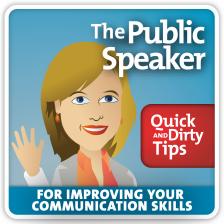Vocal Exercises for Better Public Speaking
Does your voice get tired from public speaking? Do you need to boost your vocal energy and endurance? The Public Speaker has exercises to get your voice into tip-top shape.
Lisa B. Marshall
Listen
Vocal Exercises for Better Public Speaking
I want to welcome you to today’s exercise class. Don’t worry, you don’t need a yoga mat or a heart rate monitor. We’re going to work on training our voices. .

If your vocal muscles are out of shape, you’ll tire more easily. You won’t have the energy you need to provide an engaging experience for your listeners. Today I’m going to share some exercises that will help you get your voice in public speaking shape.
Oh, and you may want to try these is a place where no one can hear you. You’ll sound a bit silly.
Basic Vocal Warm-Ups
You wouldn’t run a long distance race without warming up your muscles first, right? In the same way, you should warm up your vocal muscles before speaking in public. Here are 4 quick exercises you can do to warm up:
-
Hum your favorite tune. I use a silly one like “If You’re Happy and Your Know It”
-
Run through some scales (do re mi fa so la ti do).
-
Pretend like you’re chewing gum or eating a soft cookie using your upper and lower muscles. Chew slowly and gently to loosen your jaw.
-
Swish your tongue around your mouth. Tension sometimes mounts in the back of your tongue and this exercise will loosen and relax it.
Breathing exercises

-
Stand up, shoulders back, and hands on your stomach. Let your stomach muscles relax.
-
Breathe in through your nose and fill up your abdomen first (you should feel and see it expand), then your ribs, and all the way up to your chin.
-
Hold this breath and count to 10.
-
Now exhale slowly. As you exhale, keep your ribs expanded and tighten your abdomen. The lower abdominal muscles should come in first as though you were rolling up a tube of toothpaste.
While you are breathing, check your shoulders and stomach. Your shoulders should not be going up and your stomach should be going out.
Voice Relaxation Exercises

-
Stand up and place your hand lightly on your throat muscles and speak in a normal tone. Note the tenseness of the throat muscles and the tightness of your jaw.
-
Yawn. Open your mouth wide. Finish the yawn with a “hummmm,” prolonging the “mmm” for several seconds. Drop your jaw as far as you can without stress.
-
Waggle the jaw from side to side and continue humming with the lips closed and jaw loose.
-
Repeat the yawning and humming.
Notice your throat muscles have loosened and become relaxed.
Volume Exercises
Here are 4 exercises to help you increase your volume without straining your vocal cords:
-
Breathe deeply and exhale with a hisssssssing sound. Repeat 10 times.
-
Vary the loudness of your voice using the sound “Mmm-mmm.” Start with a soft sound, then middle, then loud. Repeat, starting with the loud sound until the soft. Repeat again soft – loud – soft – loud – soft – loud. Do this for several seconds.
-
Repeat exercise 2 using a vowel (for example, “ah”): soft – middle – loud; loud – middle – soft; soft – loud – soft; loud – soft – loud. Do this for several seconds
-
Repeat the exercise using a number of your choice.

It won’t be long before you starting noticing results from your hard work!

